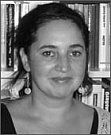Dr. Jeanine Elif Dagyeli

Scholarship Holder 07/2008 - 09/2008
Dissertation defense: 15.12.2008
Predicate: magna cum laude
PhD thesis: The Central Asian craftsmen's risala
Supervisor: Prof. Dr. Jürgen Paul, Prof. Dr. Baldauf
Financed by the Volkswagen Foundation
"Between Europe and the Orient - Central Asia/Caucasus in the focus of scholarship"
Length of project: 01.01.2005 - 31.12.2007
Project leader: Dr. habil. Ildikó Bellér-Hann
Researcher: Jeanine Elif Dagyeli
The craftsmen's risala is a well-known part of 'traditional work'. As far as the texts are concerned, the concept of crafts includes agricultural activities, so it is more appropriate to speak about 'gainful occupation' (Ar., Pers., Turki kasb).
The texts are of varying length and originate from those Republics of Central Asia which used to be part of the former Soviet Union, from Afghanistan as well as from the Xinjiang Uyghur Autonomous Region situated in the northwestern part of the People's Republic of China. The copies known to us date mostly from the nineteenth and the early twentieth centuries. The genre as such has so far not been the subject of systematic research, and it is also unclear, when and how they became obsolete in the different regions.
The texts give information about the patron saints of the profession in question and they ensure that the occupation is lawful in religious terms. There is little information concerning the technical side of the production. But the texts allow us an insight into the perceptions of work, e.g. through the terminology or through references to the hierarchy of occupations. In addition, they also shed light on the social organisation of work, the hierarchical organisation of craftsmen as well as their vocational training.
Following the collapse of the Soviet Union (and to some extent following the end of the Cultural Revolution in China) there is a perceivable 'return to tradition' in these regions. The 'traditionalisation' of crafts is part of this process. The project therefore focuses on some aspects of the concept of 'tradition' in Central Asia. Especially within the context of the former Soviet Union and in Xinjiang (Afghanistan is only investigated in the historical period) local forms of transmitting knowledge and know-how were to some extent several times interrupted. This further relativises the concept of tradition: when in modern Usbekistan reference is made to 'our traditions', which period is exactly meant? The prerevolutionary, or the time preceding Russian colonisation? Is it possible to speak about the authentic survival of the production techniques, organisational forms of crafts, the transmission of knowledge and local discourse about work?
The topic forms the basis of a social historical case study of the perception of production and of work. The aim of the project is to study the texts and their use in their historical and social context as well as to look at the changes in the organisation of crafts production. Thus it combines the methods of philology, history and to some extent social anthropology.
Curriculum Vitae
| since 2009 | Grant holder Gerda Henkel Foundation with the project: "Arbeit und Ritual - eine sozialhistorische Untersuchung von Dienstleistungsgruppen im Bereich der Begräbnisrituale" and Coordinator of a project to create a digital catalog on the Beruni Institute in Tashkent at the Gerda Henkel Foundation |
| 12/15/2008 | PhD thesis defense: "Die mittelasiatische Handwerker-risala" |
| 07/2008–09/2008 | Grant holder GS SCM |
| since 1/1 2005 | research assistant at the Center for Oriental Studies/Martin-Luther University Halle - Wittenberg |
| 1/1 2005 | M.A. at the Institute for Central Asian Studies/Humboldt University Berlin on folk medicine in Kyrgyzstan |
| 2001 | lecturer for Tajik language at the Institute for Central Asian Studies/Humboldt University Berlin |
| 2000 | research project for the ASA programme of Carl-Duisberg Society on Kyrgyz felt carpets in Kyrgyzstan |
| 1998-1999 | student assistant at Zentrum Moderner Orient Berlin |
| since 1998 | long term research on Islamic TV programmes on open acess TV (results are due to be published in November 2006) |
| 1997-1998 | participation in an interdisciplinary university study project on Muslim life in Berlin |
| 1996 | student of Central Asian Studies and Oriental Studies at Humboldt University in Berlin |
Publications
- "Life is in the Pattern: Symbolisms and Discourse in Kyrgyz Felt Carpets", in: Ute Pietruschka und Michael P. Streck in Verbindung mit Beate Eschment: Symbolische Repräsentation und Wirklichkeit nomadischen Lebens. Wiesbaden: Reichert Verlag 2010, S.57-78.
- Gott liebt das Handwerk. Zu Inhalt und Rezeption der mittelasiatischen Handwerker-risâla. Wiesbaden: Reichert Verlag, 2011.
- »Islamische Kommunikation und das Sprachproblem in der Migration - welche Sprache spricht die ’umma in Deutschland?« in: Bentzin, Anke, Jeanine E. Dagyeli, Ayfer Durdu und Riem Spielhaus (Hg.): »Islam auf Sendung. Islamische Fernsehprogramme im Offenen Kanal.« Berlin, 2006.
- »Jugendarbeit in Berliner Moscheen« in: Spielhaus, Riem und Alexa Färber (Hg.): »Islamisches Gemeindeleben in Berlin«. Schriftenreihe des Beauftragten für Integration und Migration in Berlin. Berlin, 2006.
- »Aleviten - eine Glaubensgemeinschaft aus der Türkei« in: Spielhaus, Riem und Alexa Färber (Hg.): »Islamisches Gemeindeleben in Berlin«. Schriftenreihe des Beauftragten für Integration und Migration in Berlin. Berlin, 2006.
- »Altersstruktur und altersspezifische Angebote« in: Jonker, Gerdien und Andreas Kapphan (Hg.): »Moscheen und islamisches Leben in Berlin«. Die Ausländerbeauftragte des Senats. Berlin, 1999.





